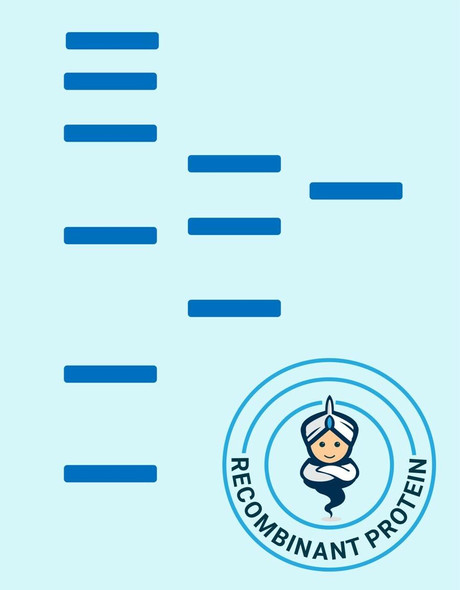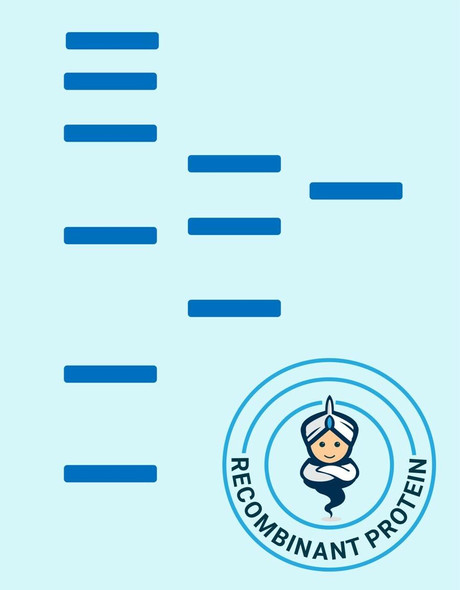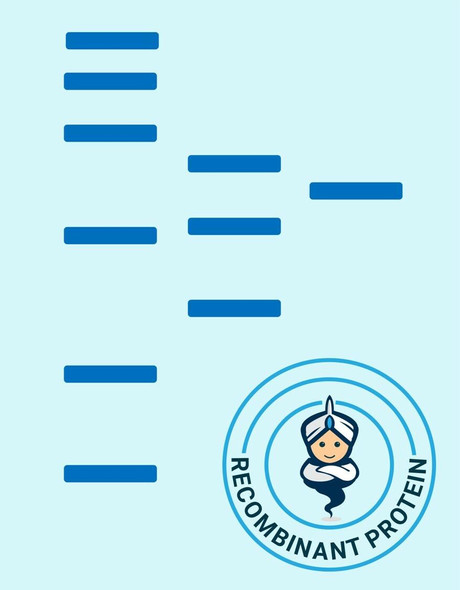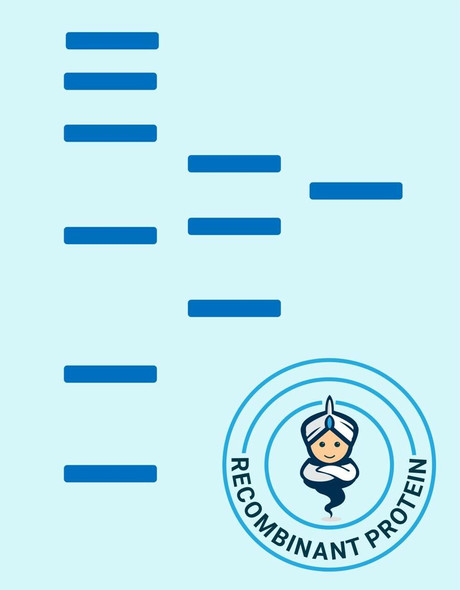Description
| Product Name: | Human ASPA Recombinant Protein |
| Product Code: | RPPB1421 |
| Size: | 20µg |
| Species: | Human |
| Target: | ASPA |
| Synonyms: | Aspartoacylase, Aminoacylase-2, ACY-2, ASPA, ACY2, ASP. |
| Source: | Escherichia Coli |
| Physical Appearance: | Sterile Filtered clear solution. |
| Formulation: | The ASPA solution (0.5mg/ml) contains 20mM Tris-HCl buffer (pH8.0), 20% glycerol, 1mM DTT, 0.1M NaCl and 0.1mM PMSF. |
| Stability: | Store at 4°C if entire vial will be used within 2-4 weeks. Store, frozen at -20°C for longer periods of time. For long term storage it is recommended to add a carrier protein (0.1% HSA or BSA).Avoid multiple freeze-thaw cycles. |
| Purity: | Greater than 90% as determined by SDS-PAGE. |
| Amino Acid Sequence: | MGSSHHHHHH SSGLVPRGSH MGSMTSCHIA EEHIQKVAIF GGTHGNELTG VFLVKHWLEN GAEIQRTGLE VKPFITNPRA VKKCTRYIDC DLNRIFDLEN LGKKMSEDLP YEVRRAQEIN HLFGPKDSED SYDIIFDLHN TTSNMGCTLI LEDSRNNFLI QMFHYIKTSL APLPCYVYLIEHPSLKYATT RSIAKYPVGI EVGPQPQGVL RADILDQMRK MIKHALDFIH HFNEGKEFPP CAIEVYKIIE KVDYPRDENG EIAAIIHPNL QDQDWKPLHP GDPMFLTLDG KTIPLGGDCT VYPVFVNEAA YYEKKEAFAK TTKLTLNAKS IRCCLH |
Aspartoacylase is a homodimer which catalyzes the deacetylation of N-acetylaspartic acid (NAA) (a protein whose hydrolysis is crucial to maintenance of intact white matter) to generate acetate and L-aspartate. Aspartoacylase (ASPA) is expressed in the liver, lung and kidney tissue, as well as in the skeletal muscle and in cerebral white matter. NAA is ample in the brain where hydrolysis by aspartoacylase is believed to aid maintain white matter. In other tissues ASPA functions as a scavenger of NAA from body fluids. ASPA gene mutations cause Canavan disease (CAND or spongy degeneration of the brain).
ASPA Human Recombinant produced in E.coli is a single, non-glycosylated polypeptide chain containing 336 amino acids (1-313) and having a molecular mass of 38.1kDa.ASPA is fused to a 23 amino acid His-tag at N-terminus & purified by proprietary chromatographic techniques.
| UniProt Protein Function: | ASPA: Catalyzes the deacetylation of N-acetylaspartic acid (NAA) to produce acetate and L-aspartate. NAA occurs in high concentration in brain and its hydrolysis NAA plays a significant part in the maintenance of intact white matter. In other tissues it act as a scavenger of NAA from body fluids. Defects in ASPA are the cause of Canavan disease (CAND); also known as spongy degeneration of the brain. CAND is a rare neurodegenerative condition of infancy or childhood characterized by white matter vacuolization and demeylination that gives rise to a spongy appearance. The clinical features are onset in early infancy, atonia of neck muscles, hypotonia, hyperextension of legs and flexion of arms, blindness, severe mental defect, megalocephaly, and death by 18 months on the average. Belongs to the AspA/AstE family. Aspartoacylase subfamily. |
| UniProt Protein Details: | Protein type:Amino Acid Metabolism - histidine; Amino Acid Metabolism - alanine, aspartate and glutamate; EC 3.5.1.15; Hydrolase Chromosomal Location of Human Ortholog: 17p13.3 Cellular Component: cytoplasm; nucleus Molecular Function:protein binding; metal ion binding; hydrolase activity, acting on ester bonds; aspartoacylase activity; aminoacylase activity Biological Process: myelination in the central nervous system; aspartate catabolic process; positive regulation of oligodendrocyte differentiation Disease: Canavan Disease |
| NCBI Summary: | This gene encodes an enzyme that catalyzes the conversion of N-acetyl_L-aspartic acid (NAA) to aspartate and acetate. NAA is abundant in the brain where hydrolysis by aspartoacylase is thought to help maintain white matter. This protein is an NAA scavenger in other tissues. Mutations in this gene cause Canavan disease. Alternatively spliced transcript variants have been found for this gene. [provided by RefSeq, Jul 2008] |
| UniProt Code: | P45381 |
| NCBI GenInfo Identifier: | 1168340 |
| NCBI Gene ID: | 443 |
| NCBI Accession: | P45381.1 |
| UniProt Related Accession: | P45381 |
| Molecular Weight: | 313 |
| NCBI Full Name: | Aspartoacylase |
| NCBI Synonym Full Names: | aspartoacylase |
| NCBI Official Symbol: | ASPA�� |
| NCBI Official Synonym Symbols: | ASP; ACY2�� |
| NCBI Protein Information: | aspartoacylase; ACY-2; aminoacylase 2; aminoacylase-2 |
| UniProt Protein Name: | Aspartoacylase |
| UniProt Synonym Protein Names: | Aminoacylase-2; ACY-2 |
| Protein Family: | Aspartocin |
| UniProt Gene Name: | ASPA�� |
| UniProt Entry Name: | ACY2_HUMAN |








